Keeping your composite kitchen sink clean spotless not only enhances the overall look of your kitchen but also extends the sink’s lifespan. Composite sinks, made from a combination of materials like granite, quartz, and resin, are known for their durability and stylish appearance. However, they require specific care to maintain their pristine condition. In this comprehensive guide, we’ll walk you through the best practices for cleaning and maintaining your composite sink. From daily maintenance tips to deep cleaning techniques and natural cleaning solutions, you’ll learn everything you need to keep your sink gleaming. Whether you’re dealing with stubborn stains or hard water deposits, our expert advice will ensure your composite sink remains a beautiful centerpiece in your kitchen.
How often should I clean my composite kitchen sink to keep it looking new?
To keep your composite kitchen sink looking new, it’s best to follow a regular cleaning routine. Perform a quick cleaning daily using mild soap and a soft sponge to prevent stains and buildup. Additionally, schedule a deep cleaning once a week to address any stubborn stains or hard water deposits. This consistent maintenance not only preserves the sink’s appearance but also extends its lifespan, ensuring it remains a stunning focal point in your kitchen. Avoid using harsh chemicals or abrasive pads, as they can damage the skin’s surface. By adhering to this routine, your composite sink will continue to look as good as new for years to come.
Understanding Composite Sinks
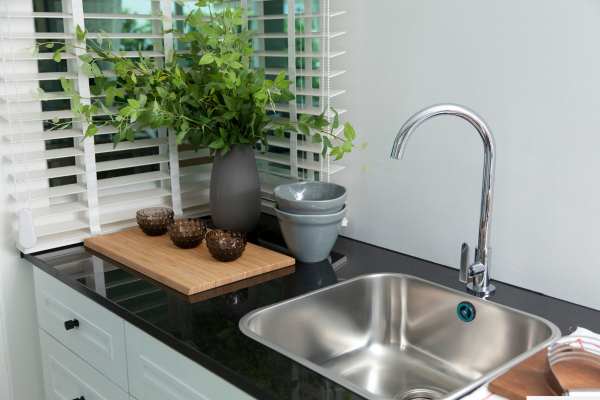
Composite sinks are a popular choice in modern kitchens due to their durability, aesthetic appeal, and versatility. Made from a blend of materials such as granite, quartz, and resin, these sinks offer a robust and stylish option for any kitchen. The combination of natural stone and synthetic materials provides a surface that is resistant to scratches, stains, and heat. Additionally, composite sinks come in a variety of colors and finishes, allowing homeowners to choose a sink that perfectly matches their kitchen decor. Understanding the composition and benefits of composite sinks is essential for proper maintenance and care.
Materials Needed
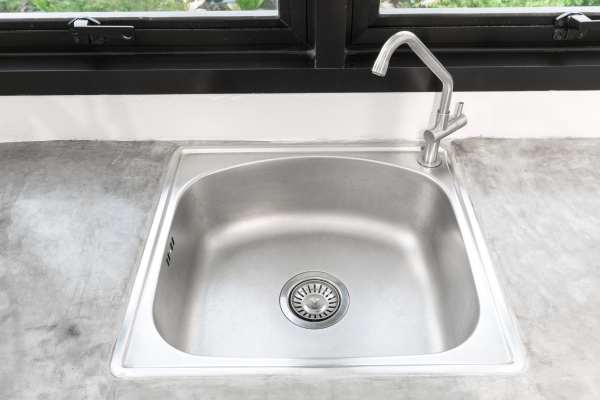
Proper cleaning of a black composite clean kitchen sink requires specific materials to ensure its longevity and maintain its appearance. You’ll need mild detergent, a soft sponge, and a microfiber cloth for everyday cleaning. For deeper cleaning, have white vinegar and baking soda on hand. A non-abrasive scrub pad or a soft-bristled toothbrush can help with stubborn stains. Avoid using harsh chemicals or abrasive tools, as they can damage the sink’s surface. Having these materials readily available makes it easier to keep your composite sink looking pristine and well-maintained.
Daily Cleaning Routine
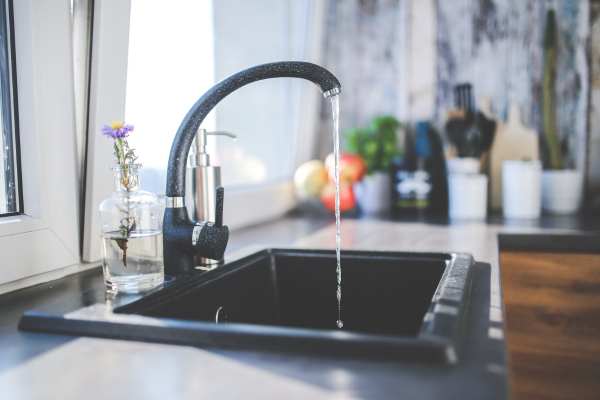
Maintaining a composite kitchen sink’s pristine condition involves a simple daily cleaning routine. Start by rinsing the sink with warm water to remove any food particles or debris. Apply a few drops of mild detergent to a soft sponge and gently scrub the sink’s surface, paying special attention to any areas with stains or buildup. Rinse thoroughly with warm water and dry the sink with a microfiber cloth to prevent water spots. This daily routine helps prevent stains and buildup, ensuring your composite sink remains clean and attractive. Regular attention keeps your sink looking new and hygienic.
Weekly Deep Cleaning
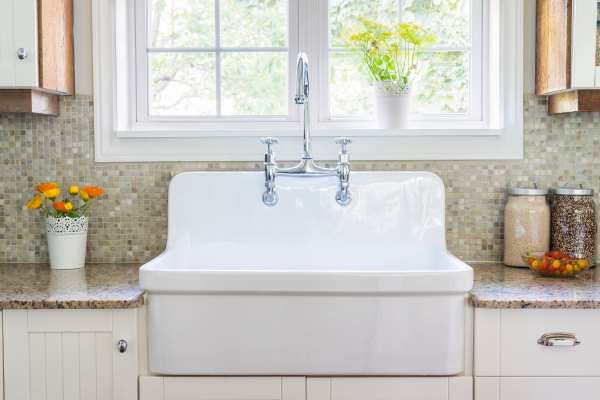
In addition to your daily cleaning routine, performing a weekly deep clean is crucial to keep your composite sink in top condition. Start by filling the sink with warm water and adding a cup of white vinegar. Let it sit for about 15 minutes to loosen any stubborn deposits. Drain the sink and sprinkle baking soda over the surface, then scrub gently with a non-abrasive scrub pad or soft-bristled toothbrush, especially in areas with visible stains. Rinse thoroughly with warm water and dry with a microfiber cloth. This weekly routine helps maintain the sink’s shine and prevents buildup of limescale and grime.
Removing Stubborn Stains

Despite regular cleaning, stubborn stains can sometimes appear on your composite sink. To tackle these, create a paste using baking soda and a small amount of water. Apply the paste to the stained areas and let it sit for about 10 minutes. Using a soft-bristled toothbrush or non-abrasive scrub pad, gently scrub the stains in a circular motion. For particularly tough stains, you can add a few drops of white vinegar to the paste before scrubbing. Rinse the sink thoroughly with warm water and dry with a microfiber cloth. This method effectively removes stains without damaging the sink’s surface.
Dealing with Hard Water Deposits
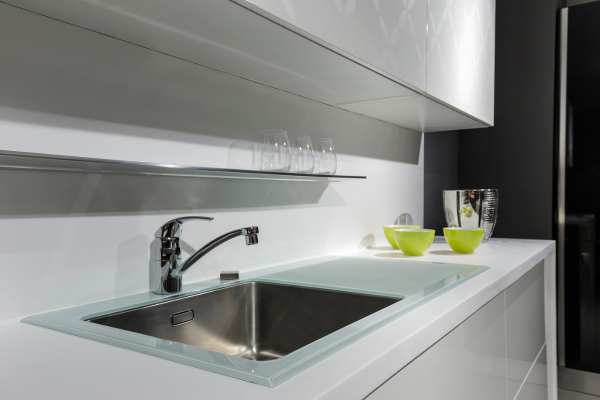
Hard water deposits can be a common issue in composite sinks, leaving unsightly white spots and limescale buildup. To address this, fill a spray bottle with a solution of equal parts white vinegar and water. Spray the affected areas generously and let the solution sit for about 10 minutes to break down the mineral deposits. Use a soft sponge or cloth to wipe away the deposits, then rinse the sink thoroughly with warm water. Dry the sink with a microfiber cloth to prevent new spots from forming. Regularly addressing hard water deposits helps keep your sink looking clean and polished.
Cleaning Without Damaging the Sink

It’s important to clean your composite kitchen sink without causing damage. Always use mild, non-abrasive cleaning agents and tools. Harsh chemicals, such as bleach or ammonia, can weaken the sink’s surface and cause discoloration. Similarly, abrasive scrubbers and steel wool can scratch the sink. Instead, opt for soft sponges, microfiber cloths, and gentle cleaning solutions like dish soap, baking soda, and vinegar. When dealing with tougher stains, use non-abrasive scrub pads and avoid excessive force. Following these guidelines ensures your sink remains in pristine condition without any risk of damage.
Natural Cleaning Solutions
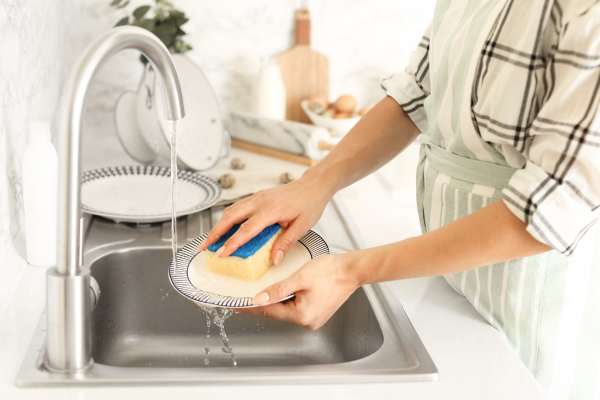
Natural cleaning solutions are not only effective but also safe for your composite sink. Baking soda and white vinegar are excellent for daily and deep cleaning. For everyday cleaning, sprinkle baking soda on the sink’s surface, scrub gently with a soft sponge, then rinse with warm water. For deep cleaning, mix equal parts white vinegar and water in a spray bottle, spray the sink, let it sit for 10 minutes, and wipe clean. Lemon juice can also be used to tackle stubborn stains and leave your sink smelling fresh. These natural solutions provide a safe and eco-friendly way to maintain your sink.
Maintenance Tips for Longevity
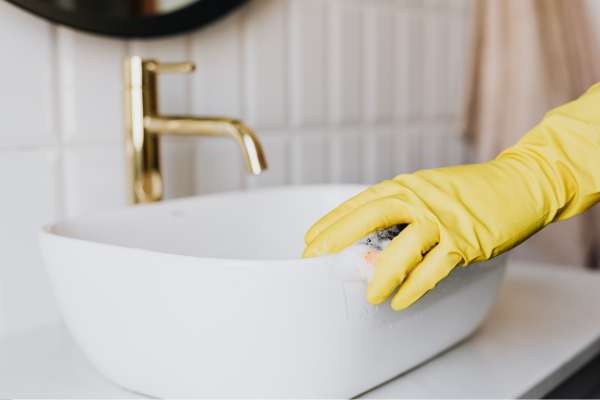
To ensure the longevity of your composite sink, adopt a few key maintenance practices. Always rinse and dry the sink after each use to prevent water spots and stains. Avoid placing hot pots and pans directly on the sink surface to prevent heat damage. Use a sink grid to protect the bottom from scratches and heavy impacts. Regularly check for and address any minor stains or deposits before they become difficult to remove. By following these tips, you can keep your composite sink looking new and extend its lifespan, maintaining its beauty and functionality for years to come.
Common Mistakes to Avoid
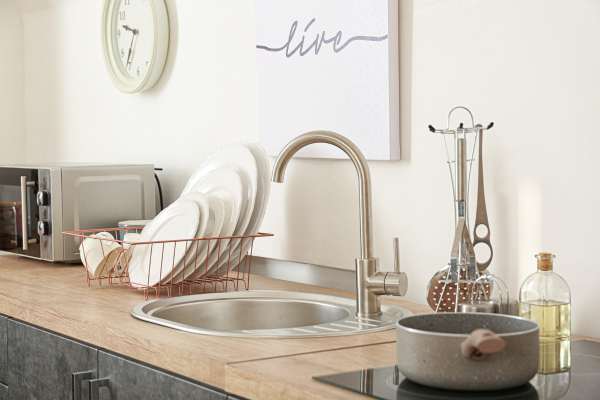
When cleaning and maintaining a composite sink, certain mistakes can cause damage. Avoid using harsh chemicals like bleach, ammonia, or heavy-duty cleaners, as they can weaken and discolor the sink’s surface. Steer clear of abrasive scrubbers and steel wool, which can scratch and dull the finish. Don’t leave acidic or staining substances, such as coffee or tomato sauce, sitting in the sink for extended periods. Failing to dry the sink after use can lead to water spots and mineral deposits. By steering clear of these common mistakes, you can preserve the integrity and appearance of your composite sink.
Conclusion
Proper cleaning and maintenance are essential for keeping your composite kitchen sink looking its best. By understanding the nature of composite sinks and using the right materials and techniques, you can ensure your sink remains in pristine condition. Daily cleaning routines, weekly deep cleans, and effective methods for removing stains and deposits are key to preserving the sink’s appearance and functionality. Avoiding harsh chemicals and abrasive tools, using natural cleaning solutions, and following maintenance tips will prolong the life of your sink. With consistent care, your composite sink will continue to be a beautiful and durable feature in your kitchen.
